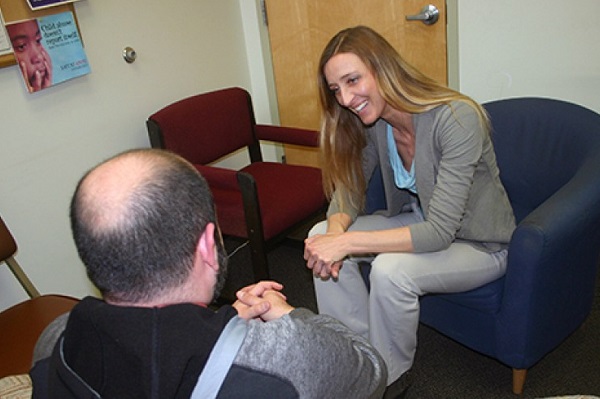Encountering Mercy: Visit the Sick
“Encountering Mercy” is a series exploring the corporal works of mercy during the Jubilee Year through the lens of the people whose lives exemplify them. In February, the Diocese of Camden focuses on “Visit the Sick.” This month’s profiles will highlight examples of those who experience this corporal work of mercy in their daily lives.
Bill’s problem was not necessarily that he was physically sick; he was angry. Very angry. So angry that it was making him physically sick.
Everything seemed to have happened at once. First, he found himself in heart-wrenching divorce proceedings that he never anticipated, reeling from feelings of both shock and betrayal.

Then, he had a knee replaced and the recovery did not go well. He was in constant pain. Six months later, the other knee had to be replaced. He was 62.
“I was probably as low as I had ever been in my life,” said Bill (last name withheld for privacy).
He went from weighing 220 to 160 pounds. Friends approached him but he told them he wasn’t ready to talk about what was happening. His pastor started to express his concern.
“I looked like I was dying, like I had a cancer that was eating away,” he said.
A priest, Father Sanjai Devis, told him about Catholic Charities’ counseling program and made the phone call. Soon, Bill began meeting with counselor Rod J. Herrera, a licensed clinical social worker, every week.
“I went through a long time of a lot of anger and it just wore away at me,” Bill said. “If it wasn’t for Rod and Catholic Charities I wouldn’t be where I am right now.”
They met regularly for a year — at first every week, then every two weeks, then once a month. Slowly Bill’s anger was replaced with peace.
“When I left after a year, it was bittersweet, because it meant losing that closeness, that camaraderie — being able to talk to somebody, and him just listen,” he said. “But it was good also to stop at that point knowing that I was in a better place, a much better place.”
Because of the condition of Bill’s knees, he had had to stop working a year before the operations. He was receiving only a limited fixed income at the time of the counseling. Catholic Charities was able to work with him to establish an affordable fee.
The agency looks at potential clients’ financial situations – such as income levels and types of financial hardships – when determining their counseling fees along a sliding scale, and accepts certain types of insurance.
Catholic Charities’ outpatient counseling services include one-on-one counseling sessions for adults, family therapy, couples counseling, and group counseling sessions.
“We don’t think of our clients as ‘sick,’ but that certainly depression or anxiety or whatever they are suffering from is something that needs our attention,” said Sylvia C. Loumeau, director of Catholic Charities’ counseling programs.
“We are there with them, asking them to share their experience, bearing witness to it, validating it, and attempting to help them figure out how to heal from whatever trauma or experience they have had.”
Because of Catholic Charities’ mission, although clients are never asked about their faith, it can be part of the conversation if it helps a client heal.
“I consider myself to be a faith-based therapist, which means I’m comfortable bringing spirituality, especially Catholicism, into our counseling sessions. Some clients ask that we pray before we begin our sessions and I ask the Holy Spirit to be present,” said counselor Herrera, who is also the director of the Office of Child and Youth Protection for the Diocese of Camden.
In the four years since he ended counseling, Bill’s life, as he put it, has taken a “180” degree turn.
“If it wasn’t for Rod and Catholic Charities, I wouldn’t be where I am right now,” he said. “I finally got rid of that anger.”
He began attending a group for divorced Catholics that helped him continue the healing process. Within a few years, he met a woman who he calls “the love of his life.” She, too, has helped him along the road, he says.
Father Devis, the same priest who had originally recommended counseling, approached him a year later and invited him to participate in a newly forming Stephen Ministry at his parish.
Stephen Ministry is an organization made up of parishioners who are assigned in one to one, confidential relationships with someone who is grieving, lonely, or going through a major loss or transition. The ministers receive extensive training on how to listen and provide support, and the relationships can last for as long as a year or more.
Father Devis is now director of Stephen Ministry for the Diocese of Camden under VITALity, the diocese’s new home and parish healthcare services office.
Bill went through the 50-hour training program and began meeting with a “care receiver” every week, accompanying him during a difficult period in his life.
“I needed help and people reached out to me and for me. Knowing how bad my situation was, and being able to help someone else who needed help, a friend; it was very rewarding for me,” he said of his experiences in Stephen Ministry.
He started attending Mass every day and was invited to be an altar server by his priest. Even though his brothers had been altar boys, Bill had never served before. He laughs now, thinking of how he became an altar server at 66 years old. He serves Mass every day except Sundays.
“All that’s happened to me has happened to me because of a reason. That’s how I have to look at it,” he said. “Serving Mass for me is sort of a way of paying back for everything that has been done for me.”
Written by Joanna Gardner
The mercy of visiting the sick
In 1984, in the midst of the Jubilee Year of Redemption, Pope John Paul II published his apostolic letter Salvifici Doloris: On the Meaning of Human Suffering. In the letter he explores the age-old “problem of pain” in light of the Resurrection. In the letter’s introduction, selections of which are quoted below, he highlights the church’s essential role: accompanying those who are suffering. It states:
“It can be said that man in a special fashion becomes the way for the church when suffering enters his life. This happens, as we know, at different moments in life, it takes place in different ways, it assumes different dimensions; nevertheless, in whatever form, suffering seems to be, and is, almost inseparable from man’s earthly existence.
“Assuming then that throughout his earthly life man walks in one manner or another on the long path of suffering, it is precisely on this path that the Church at all times … should meet man. Born of the mystery of Redemption in the Cross of Christ, the Church has to try to meet man in a special way on the path of his suffering. In this meeting, man “becomes the way for the Church,” and this way is one of the most important ones.”
